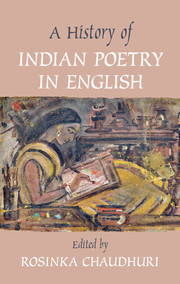Book contents
- Frontmatter
- Contents
- Contributors
- Acknowledgments
- Introduction
- SECTION I THE BROAD NINETEENTH CENTURY: INDIANS IN ENGLISH AND THE ENGLISH IN INDIA
- SECTION II PUBLISHERS, PUBLISHING HOUSES, AND THE PERIODICAL PRESS
- SECTION III POETRY: 1950–2000
- 13 Nissim Ezekiel: Poet of a Minor Literature
- 14 Dom Moraes: A Poet's Progress
- 15 Interpretative Testimony: Kamala Das and Eunice de Souza
- 16 Adil Jussawala and the Double Edge of Poetry
- 17 Arvind Krishna Mehrotra and the Interplay of Languages
- 18 Arun Kolatkar: A Singular Poetry in Two Languages
- 19 Imagery and Imagination in the Poetry of Jayanta Mahapatra
- 20 Modernisms and Modernity: Keki Daruwalla and Gieve Patel
- 21 The Third Generation: Melanie Silgardo and Manohar Shetty
- SECTION IV POETS OF THE DIASPORA
- SECTION V THE NEW MILLENNIUM POETS ON THEMSELVES
- Bibliography
- Index
16 - Adil Jussawala and the Double Edge of Poetry
from SECTION III - POETRY: 1950–2000
Published online by Cambridge University Press: 05 March 2016
- Frontmatter
- Contents
- Contributors
- Acknowledgments
- Introduction
- SECTION I THE BROAD NINETEENTH CENTURY: INDIANS IN ENGLISH AND THE ENGLISH IN INDIA
- SECTION II PUBLISHERS, PUBLISHING HOUSES, AND THE PERIODICAL PRESS
- SECTION III POETRY: 1950–2000
- 13 Nissim Ezekiel: Poet of a Minor Literature
- 14 Dom Moraes: A Poet's Progress
- 15 Interpretative Testimony: Kamala Das and Eunice de Souza
- 16 Adil Jussawala and the Double Edge of Poetry
- 17 Arvind Krishna Mehrotra and the Interplay of Languages
- 18 Arun Kolatkar: A Singular Poetry in Two Languages
- 19 Imagery and Imagination in the Poetry of Jayanta Mahapatra
- 20 Modernisms and Modernity: Keki Daruwalla and Gieve Patel
- 21 The Third Generation: Melanie Silgardo and Manohar Shetty
- SECTION IV POETS OF THE DIASPORA
- SECTION V THE NEW MILLENNIUM POETS ON THEMSELVES
- Bibliography
- Index
Summary
Adil Jussawalla was born in 1940, seven years before Salman Rushdie. They were delivered in Bombay by the same doctor, went to the same school (Cathedral School), lived on the same street, and finally, as the poet acknowledged with the elegant (self)mockery and wry disenchantment that sets the tone for many of his essays: “he wrote my novel, Midnight's Children.” This statement reflects one of the common threads of Jussawalla's life and oeuvre: the struggle to find his own voice, which also speaks of the anxiety of belatedness (“you've nothing left to say”), the tensions of belonging, and the temptation of silence. A precocious poet who published his first collection, Land's End, in 1962, his influential anthology, New Writing in India, in 1974, and his second book of poems, Missing Person, in 1976, Adil Jussawalla did not publish another collection for thirty-five years.
But the poet has also been a prolific prose writer. Jussawalla, who initially wanted to be a playwright, wrote two unpublished plays in the late ’50s (Jian and Floodwaters), and worked on an unfinished and partly autobiographical novel (Dolly Cobra) in the ’70s. He also wrote several short stories and penned the English verse narrative of a play (Chyakravuya) by Manipuri director Ratan Thyam, which was broadcast on Channel 4 in 1989. A book review, literary, or copy editor for different journals and magazines (such as Indian Express, Debonair, and Science Age), he was also a regular columnist and contributor for Gentleman, Deccan Herald, The Daily, and The Observer and wrote a fortnightly column for Associated News Features. His volume of collected “essays and entertainments” was recently published (Maps for a Mortal Moon, 2014), and reveals that his poetry had not dried out in the last thirty years; it was only hiding in the folds and creases of his prose.
It is impossible to write about Jussawalla's place in the field of Indian poetry in English without also discussing his defining intellectual presence and his role as the living memory of Bombay. His apartment in the South Bombay area of Cuffe Parade has been described as “Noah's archive,” a fitting depiction for a poet who also spent a lifetime rescuing and recollecting the neglected stories of India's cultural and literary history, resurrecting its forgotten voices and figures, and inciting others to do so.
- Type
- Chapter
- Information
- A History of Indian Poetry in English , pp. 251 - 266Publisher: Cambridge University PressPrint publication year: 2016
- 1
- Cited by



